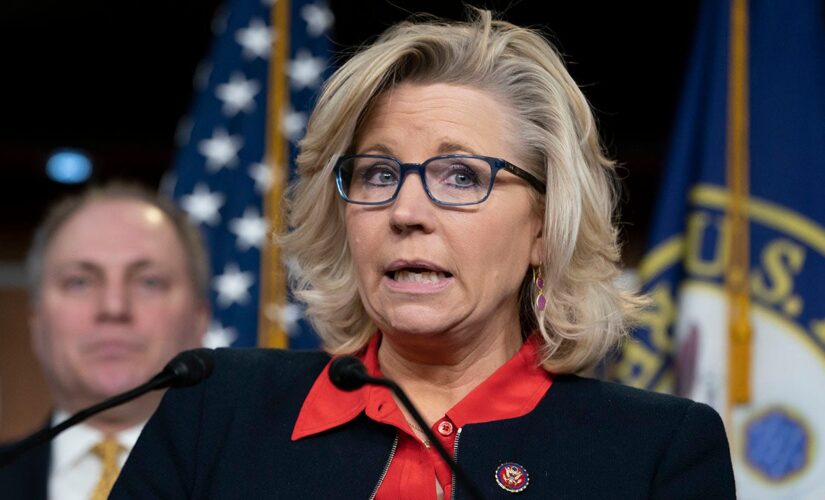NEWYou can now listen to Fox News articles!
The House voted Wednesday to update the rules for congressional certification of presidential elections, a response to then-President Donald Trump’s questioning of the 2020 contest that Democrats and Republicans such as Rep. Liz Cheney say led to an attempted “insurrection.”
The Presidential Election Reform Act was sponsored by the Wyoming Republican and Rep. Zoe Lofgren, D-Calif., both of whom serve on the select committee investigating the Jan. 6 election protest at the Capitol that turned violent. It passed the House with support from every Democrat and just nine Republicans.
Their bill targets Trump’s attempt to convince then-Vice President Mike Pence to challenge the electoral vote count as it was taking place on Jan. 6, 2021. Democrats said the perception that Pence had the power to overturn the electoral count contributed to the Capitol Hill protest.
The bill passed in the House today amends the Electoral Count Act of 1887 to clarify that the vice president only has a ministerial role and cannot interfere with the process or make judgments about the validity of electoral college votes. Cheney said that language was aimed at preventing a repeat of Trump’s actions.
(AP Photo/J. Scott Applewhite)
(AP)
CHENEY-BACKED ELECTION REFORM BILL STRIPS VP OF ALL AUTHORITY WHEN COUNTING PRESIDENTIAL VOTES
“January 6… was not ‘Democracy in action,'” Cheney said during floor debate. “Our oath of office is to support and defend the Constitution, which provides the method by which we elect our President. Legal challenges are not improper, but Donald Trump’s refusal to abide by the rulings of the courts certainly was.”
Cheney added that the Jan. 6 Committee has showed that Trump knew what he was doing was illegal, “but he did it anyway.”
The bill also makes it much harder for lawmakers to object to the validity of electoral votes. Today, one member each from the House and Senate is needed to lodge an objection, but the bill would require one-third of both chambers before an objection can be heard.
Democrats accused Republicans who failed to back the bill of supporting violent extremism.
“Our Republican colleagues who are opposed to this legislation once again find themselves on the side of violent extremists,” said Rep. Pete Aguilar, D-Calif. He said passing the bill is a move to “protect rule of law, strengthen the Constitution, and vote against insurrection.”
Donald Trump and Mike Pence pose together on a stage.
(Getty Images)
Republicans fumed that they were left out of the process of developing the bill and noted the bill appeared without any hearing of change to amend it. They also accused Democrats of trying to keep voters’ attention on Donald Trump during the mid-term elections.
“Given all the majority’s righteous and high-minded talk over the last two years about how democracy itself is in peril, don’t you think it would be better served to have operated through regular order with real member buy-in on a topic that is as important to the American people as this one?” Rep. Tom Cole, R-Okla., said this week.
“The midterm elections are just a week away, and Democrats in the 1/6 committee are desperately trying to talk about their favorite topic, and that is former President Trump,” said Rep. Rodney Davis, R-Ill., who chairs the House Administration Committee.
Republicans did acknowledge that clarifying the vice president’s role as ministerial is a welcome idea, and several agreed that no vice president should have the power to pick the winner of the presidential election on the fly.
But some Republicans said the Cheney-Lofgren bill goes too far in prescribing election rules for states. The legislation requires governors to transmit their election results to the Archivist of the United States by Dec. 14 and allows candidates to file legal action against governors who fail to meet this requirement.
WASHINGTON, DC – JUNE 13: (L-R) U.S. Rep. Liz Cheney, Vice Chairwoman of the Select Committee to Investigate the January 6th Attack on the U.S. Capitol, and Rep. Zoe Lofgren (D-CA) talk during a hearing on the January 6th investigation in the Cannon House Office Building on June 13, 2022 in Washington, DC. (Photo by Alex Wong/Getty Images)
NEW YORK AG SUES TRUMP OVER FRAUD ALLEGATIONS
It also requires states to determine their election results according to rules in place at the time of the election, but allows states to extend elections in the event of a natural disaster that prevents a “substantial portion” of voters from voting or destroys or makes ballots unreadable.
Davis said he opposed this language because it establishes federal guidelines for elections that should be run by the states.
“The Constitution is clear,” Davis said. “States have the primary role in federal elections, with Congress – us – playing a secondary role. Yet some of the provisions in their proposal would trample on state sovereignty and grant Congress unprecedented authority to interpret state laws.”
CLICK HERE TO GET THE FOX NEWS APP
Some Republicans added that allowing candidates to seek natural disaster exemptions to extend the election could lead to a more chaotic post-election period and predicted that candidates would seek any option available to prolong the process in close elections.
Others rejected the idea that the bill is bipartisan simply because it has the support of Cheney and Rep. Adam Kinzinger, R-Ill., the only two Republicans to serve on the January 6 Committee and two of 10 House lawmakers who voted to impeach President Trump over the January 6 protest at the Capitol.




